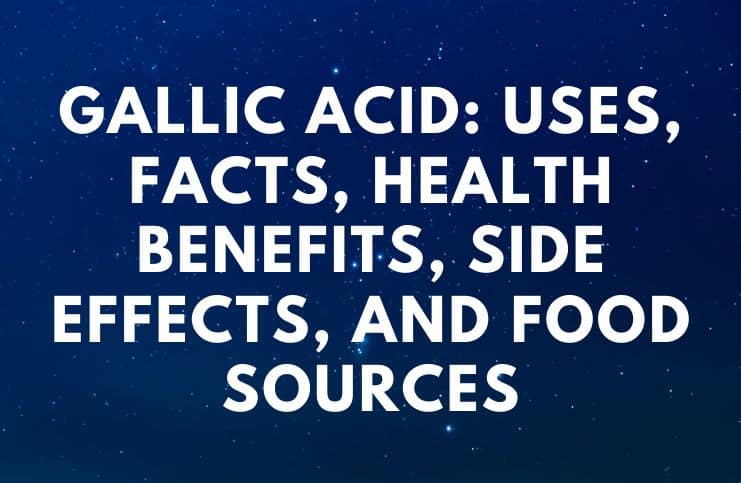Gallic acid, chemical formula – C6H2(OH)3CO2H – is an acid found in many plants and acts as an antioxidant, helping to protect our cells against oxidative damage.
Uses and Facts
It is used in the pharmaceutical industry as a standard for determining the phenol content (a large group of several hundred chemical substances) of various analytes by the Folin-Ciocalteau assay.
In addition, it is used as a starting material in the synthesis of the naturally occurring alkaloid mescaline, and as an ink dye by early photographers to develop images.
When heated to 200°–250° C, gallic acid splits into pyrogallol (pyrogallic acid) and carbon dioxide.
Health Benefits of Gallic Acid
Neurodegenerative diseases protection
Neurodegenerative diseases cause your brain and nerves to deteriorate over time. More importantly, they can also destroy your nerves and brain’s tissue, and cause confusion and change your personality.
In research, it is extracted from grape seeds and has been established to inhibit the formation of amyloid fibrils (protein aggregates that form under certain conditions), one of the potential causes of Parkinson’s disease and Alzheimer’s disease.
Protection against free radicals
This compound has antioxidant properties (an antioxidant is a substance that protects the body’s cells from the harmful free radicals) and helps to protect our cells against oxidative damage.
Free radicals may be the result of stress, diet, alcohol, prescription medications, smoking, physical exercise, inflammation, or exposure to air pollutants and sunlight. They can cause significant damage to parts of cells such as DNA, proteins, and cell membranes by taking their electrons through a process called oxidation.
Anti-inflammatory properties
Inflammation is part of the body’s normal immune response and without it, we can’t heal. However, chronic inflammation is not so good.
Instead of helping your body heal, it’s associated with problems such as – arthritis, diabetes, Alzheimer’s disease, and hair loss. Moreover, it’s believed to play an important role in heart disease, obesity, and cancer.
Allergen protection
Histamine is a protein released by the body in response to an allergen (a substance such as animal dander or pollen which generates an allergic reaction because the body identifies it as risky).
Some allergic reactions are usually contained in one symptom and will not progress beyond the initial response to the release of histamines. A 2005 study concluded that this compound helped reduce inflammatory allergic reactions linked to histamine exposure, making it helpful for treating the symptoms of inflammatory allergies.
Boosts the immune system
The immune system, which is made up of proteins, cells, organs, and tissues, protects us against microorganisms and germs daily.
Among the more important cells involved in the immune system functions are the leukocytes, better known as white blood cells, which come in two main types that combine to remove disease-causing organisms.
This compound enhances the activity of the immune system and also has anti-fungal and antiviral properties.
Heart health
Type 1 diabetes, an auto-immune condition, puts individuals at increased risk for heart disease. For example, cardiovascular complications and heart attacks cause the death of three out of every four patients with type 1 diabetes.
A 2011 study at the Department of Pharmacology, Nirma University, India, established that supplementation with this substance is beneficial for treating heart damage as a result of type 1 diabetes.
Fights cancer cells
Cancer accounts for more deaths worldwide than malaria, AIDS, and tuberculosis combined.
This compound was found to show cytotoxicity (the quality of being toxic to cells) against cancer cells, without damaging healthy cells.
Moreover, gallic acid has been found to induce apoptosis (the death of cells) of cancer cells via the mitochondria-mediated pathways. In studies, grape seed extract has shown potent properties in vitro anticancer efficacy against human prostate cancer cells.
Side Effects Of Gallic Acid
It does not have any negative effect on the healthy cells of our body. However, ingesting high amounts of supplements containing this substance can interfere with hypertension medications.
Consult with your healthcare specialist before intaking any supplements if you are currently taking any hypertension prescription medications.
Food Sources
It is found, both free and as part of tannins, in gallnuts, bananas, vinegar, sumac, grapes, tea leaves, Caesalpinia mimosoides, witch hazel, cloves, watercress, strawberries, blue-green alga Microcystis aeruginosa, oak bark, and a variety of other herbs and plants.
References https://academic.oup.com/toxsci/article/91/1/123/1672576/ https://www.ncbi.nlm.nih.gov/pmc/articles/PMC3249782/




